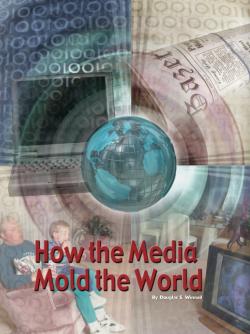The Origin of the Universe
Astronomers and philosophers have long wondered about the origin of the universe. Yet Scripture has contained plain and simple answers for millennia. Amazingly, science is just now beginning to catch up with Scripture!
Over the last century, debate has raged regarding the origin of the universe. Has the universe always existed? If not, when did it come into existence—and how did it come into existence?
If there was a moment of time when the universe came into existence, logic alone would tell you that a creator was involved. When we look at a well-designed painting, we inherently know that it has not always existed. Scientifically, one could have the wood frame dated, as well as the pigments in the paint, and it would quickly become evident that there was a specific time when the painting was brought into existence. A painter must actually have painted the canvas.
In the last decade, the Hubble telescope has provided dramatic new evidence that the universe has not always existed. The universe is rapidly moving apart, and is constantly expanding. Most scientists now believe that the universe exploded into existence some 14 or more billion years ago.
This evidence of the creation event, which some scientists call the "big bang theory," is mounting year by year. Science now confirms that there has been no past eternity of matter! Amazingly, even Albert Einstein laid the foundation for understanding that matter has not always existed, with his famous "general theory of relativity." This well-accepted principle of physics was used to demonstrate mathematically that the universe had a beginning, and that all matter came into existence from outside the physical realm, outside the laws of physics.
In Hebrews 11:3 we read: "The worlds were framed by the Word of God, so that the things which are seen [the universe] were not made of things which are visible [matter]."
The Bible clearly states that the universe was not made from pre-existing matter. That fits precisely with the evidence in astronomy and physics. So, if the universe was not made of pre-existing material or matter, how did it come into existence? Science cannot answer this, but God tells us His method of creation: "He has made the earth by His power" (Jeremiah 10:12). God created the earth—and all the universe—from His power, or energy. Nuclear physicists have known for years that energy can theoretically be converted into mass and, conversely, that mass can be converted into energy. This is how the mass of a nuclear bomb is released into energy.
So, in the creation event—what some scientists call the "big bang"—the Creator God brought the universe into existence by His power or energy. This becomes the missing ingredient that explains what astrophysicists are observing in the universe.
There is one more crucial bit of amazing information about the creation and origin of the universe, which we can find in God's word and which has recently been proven in astronomy and physics: "It is He who sits above the circle of the earth… who stretches out the heavens like a curtain" (Isaiah 40:22). The Hebrew verb translated "stretches" is in the present tense. In other words, God is still stretching out the universe. This fits precisely with what has been observed by the Hubble telescope: the universe is still rapidly expanding.
In the same verse, we read that God "spreads [the heavens] out like a tent to dwell in." Here, in the Hebrew, "spreads" is in the past tense. God's Word indicates that in the original creation event, He stretched out the heavens, and that the universe is still being stretched out in continuing expansion, as seen by the Hubble telescope.
Amazingly, science is finally catching up in understanding with the Bible concerning the origin of the universe.






